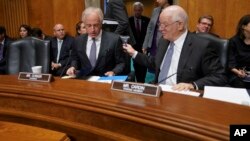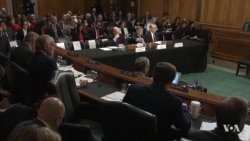For the first time in decades, U.S. lawmakers on Tuesday examined the nuclear authority wielded by American presidents and, in particular, whether President Donald Trump could order a pre-emptive nuclear strike on North Korea.
"The system as it is set up today provides the president with the sole and ultimate authority to use nuclear weapons," said Senator Ben Cardin of Maryland, ranking Democrat on the Senate Foreign Relations Committee.
"We are concerned that the president of the United States is so unstable, is so volatile ... that he might order a nuclear weapons strike [against North Korea]," said Democratic Senator Chris Murphy of Connecticut.
Trump repeatedly has belittled North Korea's leader and issued blunt warnings about "fire and fury" to Pyongyang.
While not defending the president's rhetoric, one Republican noted that elections have consequences.
"One of the things that voters think about when they elect someone to the office of president of the United States is whether or not they want to entrust them with this [nuclear] capability," said Senator Marco Rubio of Florida.
Testifying before the committee were former high-ranking Pentagon officials, who said that Trump, like presidents before him, has absolute, unilateral authority to order a retaliatory nuclear strike, but not a pre-emptive nuclear attack.
"This is a system controlled by human beings. Nothing happens automatically," said retired Air Force General C. Robert Kehler, who oversaw America's nuclear arsenal as commander of U.S. Strategic Command during the Obama administration.
Kehler and others testified that nuclear protocols ensure swift execution of a president's nuclear launch order in the event of a nuclear attack on America — not a pre-emptive strike against North Korea or any other adversary.
"That's war in the constitutional sense that Congress should authorize," said former U.S. Defense Department Undersecretary Brian McKeon.
WATCH: Senate reviews nuclear authority
Despite such assurances, Democrats have drafted a bill stipulating the president must obtain a declaration of war from Congress before ordering a nuclear first strike. Republicans cautioned against creating any doubts on the world stage about America's nuclear deterrent and its determination to respond to threats.
"Every single word that's been uttered here this morning in this hearing is going to be analyzed in Pyongyang, and they are going to look very carefully at how we, the American people, view this," said Senator James Risch of Idaho.
Democrats insisted a more pressing danger exists.
"Many Americans share my fear that the president's bombastic words could turn into nuclear reality," said Senator Ed Markey of Massachusetts.
The last congressional examination of presidential nuclear authority occurred more than 40 years ago during the Cold War with the former Soviet Union.





























